Progress Report from Poland
Air Date: Week of December 12, 2008
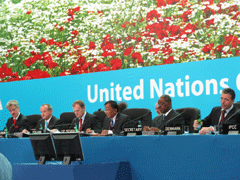
Opening remarks at UN climate change talks. (Courtesy of UNFCCC)
Thousands of delegates from nearly 190 countries converged on Poznan, Poland to chart a new path forward on climate change. Progress was modest at this meeting but Massachusetts Senator John Kerry tells host Steve Curwood that he’s optimistic the U.S. will play a vital part in cutting greenhouse gas emissions and forging an effective climate treaty under the next administration.
Transcript
[THEME]
CURWOOD: From the U.N. Climate Change Conference in Poznan, Poland, this is Living on Earth. I’m Steve Curwood.
[SOUND OF BAGPIPES]
CURWOOD: A bagpiper walks through the cobblestone streets of Old Market Square in Poznan.
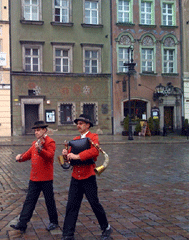
Musicians in Poznan. (Photo: Bruce Gellerman)
[CHRISTMAS CAROLS IN POLISH]
CURWOOD: Through wars and rebellion, Poznan has endured - in part, because of the population’s steadfast faith. The city is where the first Catholic cathedral was built in this part of Europe. In Polish, Poznan means “meeting place” and today locals and tourists gather during the Christmas season in the Old Market Square, where the town hall is topped by a clock that features two metal billie goats that butt heads at high noon. But for the past 12 days, to see some real head butting, head over to Poznan’s International Fairgrounds just beyond the market square.
[SOUNDS OF MEETINGS]
CURWOOD: It’s here that over 10,000 delegates from nearly 190 nations have been locking horns, trying to make progress on what’s known as a roadmap to Copenhagen where countries have pledged to finalize a new version of the 11-year-old Kyoto Protocol.
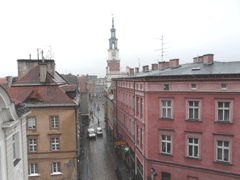
Poznan, Poland. (Photo: Bruce Gellerman)
BAN: We look for leadership from the United States. It is therefore encouraging to hear about the incoming administration’s plan to put alternative energy, environmentalism and climate change at the very center of America’s definition of national security, economic recovery, and prosperity.
CURWOOD: But for the moment George Bush is still in charge, and Jim Connaughton, the chair of the White House council on Environmental Quality, was in Poznan and defended the administration’s record on climate change.
CONNAUGHTON: We need to keep our eye on the ball. We need new technologies. We need strong emission commitments from every major economy. And we need to come up with practical courses of action working with the developing world. We can see a successful outcome by the end of next year, if we roll up our sleeves, focus on realistic objectives and practical actions. If we continue to reinvent the failed approaches of the past, I fear it will take many years before we come to an agreement. We can’t afford to wait.
CURWOOD: The failed approaches of the past? What do you mean?
CONNAUGHTON: Such as the omission of key emerging economies from taking on binding commitments. The lack of meaningful domestic programs that would back up the international commitments. And the inclusion of many, many issues irrelevant to the subject of climate change that are very well addressed in other UN settings and other multilateral settings.
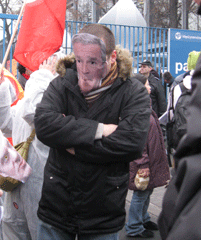
President George W. Bush's absence from international climate change negotiations is noted in Poznan. (Photo: Ingrid Lobet)
CONNAUGHTON: They’ve got to hit the ground running; keep your eye on the ball. America has the leadership policies. America’s actually producing the leadership outcomes. We had a net decrease of greenhouse gases under President Bush of three percent. Second only to France among the major economies. They can build on that record, but they’ve gotta be realistic. Break the problem into its smaller parts, come up with agreement on what can be reasonably achievable, and then do your best to get it done. And try to stay away from the rhetoric. Focus on real outcomes.
CURWOOD: James Connaughton is the outgoing chairman of the White House Council on Environmental Quality.
Democrat John Kerry is the incoming chair of the Senate foreign relations committee. He came to Poznan in his official capacity as a senate leader, and as the eyes and ears of the president-elect.
KERRY: I think the Bush Administration has lost eight years on one of the most urgent subjects before the world. And I regret that they have consistently stonewalled the concept of mandatory targets and reductions of emissions. Now that said, they have advanced a sort of schedule for negotiations next year, and I give them credit for putting that in place and making sure that this process will continue with a meeting in March, with another meeting in June, where real negotiating will begin. And the next administration will have an opportunity to be there front and center. So I think it’s, you know, time to move on from the lost opportunities and start looking at the ones that have been found through these elections and through the inauguration of President Obama on January 20th.
CURWOOD: Now, privately, some of the senior officials from some of the negotiations here in Poznan say that you know, this is really frankly come down to just marking time. That it’s the end of the U.S. administration, things aren’t happening and, really, what needs to happen is that the U.S. and China need to sit down together and talk to work out how things will move forward, or to really get a text going.
KERRY: I think that’s part of it. But it’s going to take more than just the Chinese. The Chinese have surpassed us as the top emitter of greenhouse gases in the world. We’re number two. But close behind are India and Japan and then the European community and Korea and others, all of whom are going to have to be part of the solution.
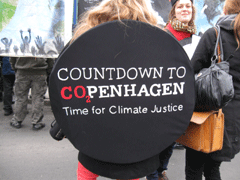
Attendees look forward to Copenhagen. (Photo: Ingrid Lobet)
KERRY: Well I think they can be very ready. There are many people who’ve been following this for a long period of time, myself included. So this is really a matter of leadership and willpower. There are details to be worked out in terms of cap and trade, auctions, mitigation funds, adaptation funds, but that’s gonna be a measure of each countries reasonableness in coming to the table. So we’re just gonna have to find the mechanisms, and I think over a year, we ought to be able to find the principal ones which are the target levels that the developed countries are prepared to adopt, mandatorily to reduce their emissions. That will set off, that’s a trigger that sets off a whole bunch of other actions that begin to flow from it. I think we can achieve that by Copenhagen.
CURWOOD: In your view, the process will be done in time to have a treaty in Copenhagen.
KERRY: No, I said I think we can achieve that in Copenhagen. It will depend on the quality of the leadership put forward by heads of states as well as the negotiators that are empowered by them to carry out their stated programs. I believe it can be done. The leadership is there. I will make a series of recommendations to President-elect Obama as to what I believe he ought to do to help make that happen, and my hope is that it will happen by Copenhagen. But nothing is a sure bet.
CURWOOD: What should happen next in terms of climate in our domestic policy? What has to be in a treaty to make your job possible, that is someone who would shepherd the treaty through the senate to ratification?
KERRY: It’s absolutely critical, I said this to the Chinese and to the Secretary General and to Mr. de Boer and to each of the delegations I met with, because they need to help urge this – we will not pass an agreement in the United States Senate that does not have a global solution. All countries must be part of this one way or the other. Not every country has to be required to live up to the same standard of reductions or the same rate of reduction, but they all have to be committed to not making the mistakes of the past as they develop and to reducing emissions. And how we – that is the key really to the Copenhagen framework if you will, is what are the targets and what rate do certain people undertake to achieve them.
CURWOOD: And of course we have to have those targets too.
KERRY: Oh yes, the United States of America must lead on this. We need to have mandatory reductions levels. And that goes for China, Japan, India, the European community, Mexico, Korea, the near-developed countries. All of us have to be part of this solution.
CURWOOD: On the whole question of the climate negotiations, do you wake up in the morning and look in the mirror and say I’m going to have to be an optimist today, or do you wake up with a smile knowing that this is happening?
KERRY: No I really am – I’m optimistic about it. I mean there’s a huge challenge. But I’m optimistic. Let me tell you why I’m optimistic. Because first of all, we’re already making enormous progress, even in the United States. People aren’t aware of it. Over half of our economy today is actually under a voluntary mandatory reduction schedule. New England, Chicago, Illinois and a group of states in the Midwest, out west – California, Washington, Oregon, a group of states joined together and they’ve accepted targets. Secondly, there are about 450 mayors or more who have led their cities into the future as part of a climate action partnership, the mayors’ conference, who are committed to city efforts. And so a city like Oregon, Portland, Oregon, has actually reached Kyoto levels of reductions by grassroots efforts in their own initiatives. So I’m optimistic, because I see what Americans are already doing, what people around the world are doing. Secondly, I’m optimistic because I see a silver lining in this economic crisis.
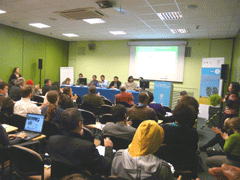
Panel discussion on indigenous people and climate change in Poznan. (Photo: Bruce Gellerman)
CURWOOD: John Kerry is the incoming chair of the Senate Foreign Relations Committee, Democrat from Massachusetts. Thanks so much, sir.
KERRY: Great to be with you. Thanks.
CURWOOD: For 12 days delegates met to debate and discuss how to fight climate change and find the money to do it. But Jennifer Morgan, global climate director for E3G, based in Berlin, says, when all was said and done - more was said than done.
MORGAN: The process is set. The chairs have what they need to drive home a deal in Copenhagen, logistically, mechanically. The politics is not set. There’s not trust now between the north and the south. Developing countries don’t believe that developed countries are actually going to come and do something. They’re not there on technology and finance yet.
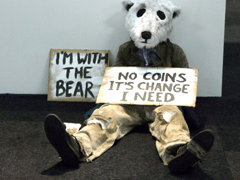
The talks on climate change attracted interested parties from all over the world. (Photo: Bruce Gellerman)
CURWOOD: Jennifer Morgan is global climate director for the group E3G.
From the crossroads of Poznan, Poland, the delegates now head home. And then in March, they go to Bonn, Germany, the next stop on the road to Copenhagen a year from now.
[MUSIC: Brave Combo “Lovers On Public Benches” from Polka’s Revenge (Dentone Records 2007)]
Coming up: Saving indigenous people, tropical forests and the planet. You’re listening to Living on Earth!
Links
Living on Earth wants to hear from you!
Living on Earth
62 Calef Highway, Suite 212
Lee, NH 03861
Telephone: 617-287-4121
E-mail: comments@loe.org
Newsletter [Click here]
Donate to Living on Earth!
Living on Earth is an independent media program and relies entirely on contributions from listeners and institutions supporting public service. Please donate now to preserve an independent environmental voice.
NewsletterLiving on Earth offers a weekly delivery of the show's rundown to your mailbox. Sign up for our newsletter today!
 Sailors For The Sea: Be the change you want to sea.
Sailors For The Sea: Be the change you want to sea.
 The Grantham Foundation for the Protection of the Environment: Committed to protecting and improving the health of the global environment.
The Grantham Foundation for the Protection of the Environment: Committed to protecting and improving the health of the global environment.
 Contribute to Living on Earth and receive, as our gift to you, an archival print of one of Mark Seth Lender's extraordinary wildlife photographs. Follow the link to see Mark's current collection of photographs.
Contribute to Living on Earth and receive, as our gift to you, an archival print of one of Mark Seth Lender's extraordinary wildlife photographs. Follow the link to see Mark's current collection of photographs.
 Buy a signed copy of Mark Seth Lender's book Smeagull the Seagull & support Living on Earth
Buy a signed copy of Mark Seth Lender's book Smeagull the Seagull & support Living on Earth

